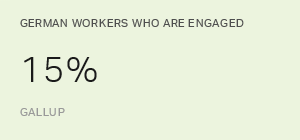German workers seem to be doing OK. More than half (55%) are in the "thriving" category of well-being, as Gallup measures it, and 54% agree or strongly agree that they're being paid appropriately for the work they do. When workers get up in the morning and think of work, 66% of them look forward to the day. In fact, 69% say they're satisfied or extremely satisfied with their company as a place to work.
But there's a difference between "satisfied" and "engaged." And that difference is costing German businesses and German workers.
Why Is Engagement so Rare?
Gallup's most recent State of the Global Workplace report found that 15% of German workers are engaged, 70% are not engaged and 15% are actively disengaged. Gallup's approach to measuring engagement places employees into one of the three aforementioned groups that characterize the extent to which employees are motivated by a sense of support and emotional attachment to their employer. The positive effects of engagement can be seen in greater profitability, productivity and discretionary diligence. Gallup estimates that actively disengaged employees cost the German economy between 80.3 billion and 105.1 billion euros per year in lost productivity.
So how can Germans be famous for their industriousness -- and deservedly so: since 2001, seven in 10 have said they'd keep working even if they inherited so much money that they didn't have to -- and still be so disengaged?
Because to leadership, workers' emotional needs just aren't on the radar. German businesses are quite good at fulfilling certain transactional needs, such as job security (extremely satisfied: 51%) and lots of days off (on average, 30 vacation days; German workers who are extremely satisfied with the amount of vacation days: 44%). They are lousy at fulfilling emotional needs, such as letting people do what they do best every day (extremely satisfied: 32%) and installing great managers (extremely satisfied: 31%). In short: German companies are good at satisfying employees and bad at engaging them.
| Importance of need | Satisfaction with need | Difference | ||||||||||||||||||||||||||||||||||||||||||||||||||||||||||||||||||||||||||||||||||||||||||||||||||
|---|---|---|---|---|---|---|---|---|---|---|---|---|---|---|---|---|---|---|---|---|---|---|---|---|---|---|---|---|---|---|---|---|---|---|---|---|---|---|---|---|---|---|---|---|---|---|---|---|---|---|---|---|---|---|---|---|---|---|---|---|---|---|---|---|---|---|---|---|---|---|---|---|---|---|---|---|---|---|---|---|---|---|---|---|---|---|---|---|---|---|---|---|---|---|---|---|---|---|---|---|
| GrandMean | GrandMean | |||||||||||||||||||||||||||||||||||||||||||||||||||||||||||||||||||||||||||||||||||||||||||||||||||
| JOB SATISFACTION NEEDS | ||||||||||||||||||||||||||||||||||||||||||||||||||||||||||||||||||||||||||||||||||||||||||||||||||||
| Job security | 4.52 | 4.28 | -0.24 | |||||||||||||||||||||||||||||||||||||||||||||||||||||||||||||||||||||||||||||||||||||||||||||||||
| Great colleagues to work with | 4.44 | 4.24 | -0.20 | |||||||||||||||||||||||||||||||||||||||||||||||||||||||||||||||||||||||||||||||||||||||||||||||||
| Vacation days | 4.33 | 4.15 | -0.18 | |||||||||||||||||||||||||||||||||||||||||||||||||||||||||||||||||||||||||||||||||||||||||||||||||
| ENGAGEMENT NEEDS | ||||||||||||||||||||||||||||||||||||||||||||||||||||||||||||||||||||||||||||||||||||||||||||||||||||
| Doing what I am really good at | 4.45 | 3.96 | -0.49 | |||||||||||||||||||||||||||||||||||||||||||||||||||||||||||||||||||||||||||||||||||||||||||||||||
| Great manager | 4.35 | 3.77 | -0.58 | |||||||||||||||||||||||||||||||||||||||||||||||||||||||||||||||||||||||||||||||||||||||||||||||||
| Autonomy | 4.13 | 3.72 | -0.41 | |||||||||||||||||||||||||||||||||||||||||||||||||||||||||||||||||||||||||||||||||||||||||||||||||
| Gallup | ||||||||||||||||||||||||||||||||||||||||||||||||||||||||||||||||||||||||||||||||||||||||||||||||||||
The problem is one of people management. Seventy percent of engagement is determined on the team level; only 30% is systemic to the organization. It's not because managers want to be poor people managers. Most want to create an engaging workplace for their team, with the retention, safety, well-being and quality improvements that follow engagement. But they can't seem to get it right. Engagement isn't improving. Just as many workers were engaged in 2002 as are engaged today.
German workers want great managers, but they don't get them.
Here are three reasons why:
1. Leaders pick the wrong people to be managers. A 2014 Gallup study found that half of all German managers said they got their role because of their expertise and tenure in their company or field (51%) or their success in a previous nonmanagerial position (47%), not because of their talent for managing people and leading teams. While proven expertise is important, it's a poor indicator of quality people management skills. The talents required to produce excellence are different from those required to inspire excellence.
2. Managers get too little of the training and support they need to engage workers. In the past 12 months, only 40% of managers participated in a training program to improve their people management skills. But the problem transcends companies. Universities, colleges and vocational education institutions are the training ground for management in Germany, but most German programs focus almost exclusively on educating managers on business economics, administration and classical management theories. These programs should place an equal emphasis on the skills needed to manage and engage workers, because strategies and processes are only as good as the people who execute them.


